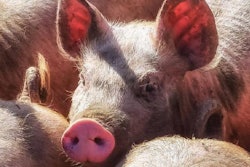
Since the start of this month, new cases of African swine fever (ASF) have been recorded among domestic pigs in 6 central and eastern European states.
So far this year, 1,037 outbreaks of African swine fever (ASF) have been confirmed among domestic pigs, according to the latest update of the Animal Disease Information Notification System from the European Commission (EC; as of August 13). Compared with the start of this month, this is an increase of 198 outbreaks. Of these, 181 were among Romanian herds.
Nine European states have registered ASF outbreaks in pigs so far in 2021. Romania now accounts for 932 outbreaks or 90% of the regional total.
During the whole of 2020, 1,240 ASF outbreaks in pigs were registered with the EC by 10 European countries. Of this total, 1,053 outbreaks were in Romania.
Polish 2021 ASF outbreak total approaches 50
Since the end of July, eight new outbreaks of ASF have occurred among Poland’s domestic pigs, according to the country’s chief veterinary office. These bring the country’s total confirmed outbreaks so far this year to 48, directly impacting 31,280 pigs.
Latest infections have been in herds of between 22 and 353 pigs in three provinces, all of which had registered previous outbreaks this year. Three of the outbreaks are reported as primary outbreaks, while the other five have been linked to other infected herds.
Since the Poland’s first cases in March of this year, outbreaks have been confirmed in 10 provinces, including in seven large herds (of around 1,000 animals or more).
ASF returns to Moldovan district
In early August, ASF virus was detected in a backyard herd in Moldova, according to the official report from the veterinary authority. Of the 10 animals in the herd, one died, and the rest have been culled, according to the World Organisation for Animal Health (OIE) report. The affected premises is in the western district of Leova. It appears to be very close to the border with Romania.
Also bordering Romania is the more northerly Moldovan district of Riscani. In April and May 2020, three wild boar at two locations in this district tested positive for the ASF virus. With no further cases since then, the national animal health agency has declared to the OIE that the disease situation has been “resolved.”
Latvia registers first cases in domestic pigs in 2021
For the first time in 12 months, there has been an ASF outbreak among Latvia’s domestic pig population.
According to the official report to the OIE, two animals died in the western municipality of Ventspils at the end of July. The remaining 2,108 pigs at the farm were culled.
By last week, the country’s second outbreak of the year was confirmed — this time in a backyard herd of just four pigs in the eastern district of Ludza. All of the pigs were killed to prevent further spread of the infection.
According to EC data, there were three ASF outbreaks in Latvian pig herds during 2020. However, the country had been free of the disease in domestic animals since July 2020.
Further cases in pigs in Romania, Ukraine
For the first time since early 2019, ASF has been detected in Ukraine’s Luhansk oblast. According to the official report to the OIE, the virus was present in a backyard herd of 19 pigs in the eastern district of Milove, which borders Russia.
In Romania, ASF continues to hit the domestic pig sector, as it has been for the past three years.
Since the start of this month, the veterinary authority has registered 172 new outbreaks with the OIE. Directly involving more than 7,000 pigs, these have occurred across much of the country.
Worst affected lately have been southern counties, where 120 of these recent outbreaks have occurred. While the majority of the affected herds are small non-commercial herds, the disease hit two registered holdings at the end of July, and a farm with 1,745 pigs the next week.
Fast-evolving ASF situation in western Russia
This month, Russian veterinary authorities officially closed an ASF outbreak series that began in February 2019. This comprised a total of 231 outbreaks in both wild and domestic pigs across multiple federal districts up to March 2021. As well as 471 cases in wild boar, more than 645,600 pigs were directly impacted by the disease through mortality or culling in this series of outbreaks.
Since March, outbreaks in Russia have been registered with the OIE by oblast (region).
After a six-month hiatus, ASF returned to Volgograd oblast at the start of August. Affected have been two backyard herds of 22 and 23 pigs. Volgograd is part of the Southern federal district.
In the Central district is Kostroma oblast, where a third backyard herd has recently tested positive for the virus. The same number of outbreaks has been confirmed in the Volga district oblast of Samara since April, including one unit with 558 pigs. In the Northwestern federal district, a first outbreak in domestic pigs was confirmed in a backyard herd in Novgorod oblast in early August.
Meanwhile, the Russian authorities have reported to the OIE that the ASF situation in the Central federal districts of Voronezh and Vladimir have been closed. The moves follow the detection of no new cases since June after two outbreaks and one outbreak among backyard herds in each oblast, respectively.
Among the wild boar in western Russia, new cases have been reported to the OIE in the Northwestern federal district (Arkhangelsk, Novgorod and Pskov), Central district (Kostroma), Southern district (Rostov), and the Volga district (Chuvash Republic and Samara).
The EC does not cover the situation in Russia through its disease notification system.
Overview of ASF situation in Europe’s wild boar
As of August 13, 12 European countries had registered 8,672 ASF outbreaks in wild boar with the EC system in 2021. Registering the most cases so far in 2021 is Hungary with 2,491 outbreaks, followed by Poland with 2,070.
Since the start of this month, Germany has confirmed the largest number of new outbreaks with the EC — an increase of 186 to 1,334. Also rising fast is Slovakia’s total, which now stands at 1,348 for the year so far.
Also confirming new cases in August have been Romania (with a current total of 838 outbreaks so far this year), Bulgaria (192), Latvia (177), Lithuania (100) and Estonia (44).
This year, Italy, Serbia and Ukraine have registered cases in wild boar with the EC.
For comparison, 14 of the region’s states recorded a total of 11,027 outbreaks during the whole of 2020.
ASF virus detected in another new district of Germany
Last week, the national veterinary agency, the Friedrich-Loeffler Institute confirmed the first case of ASF in wild boar in the Brandenburg state district of Uckermark.
This apparent spread of the infection comes after the first detection of the virus in the state’s Barnim district at the end of July. Neighboring municipalities in northern Brandenburg, both have international borders with Poland.
Together with one municipality in neighboring Saxony, this brings to eight the number of German districts registering cases of the disease in the wild population so far.
Total cases of ASF among wild boar in Germany stands at 1,920 animals, based on the latest updates from the respective administrations of the two states registering cases so far. This figure has risen by 127 since the start of this month.
Since the state’s first case of ASF in September 2020, the agriculture ministry of Brandenburg gives its total as 1,511 confirmed cases (as of August 16).
Saxony is the only other state in Germany where ASF-positive cases have been detected among wild boar. Also as of August 13, its total had reached 409 cases, reported the agriculture ministry.
So far, there have been just three ASF outbreaks in Germany’s domestic pig population — all in Brandenburg during July.
View our continuing coverage of the global African swine fever situation.

















